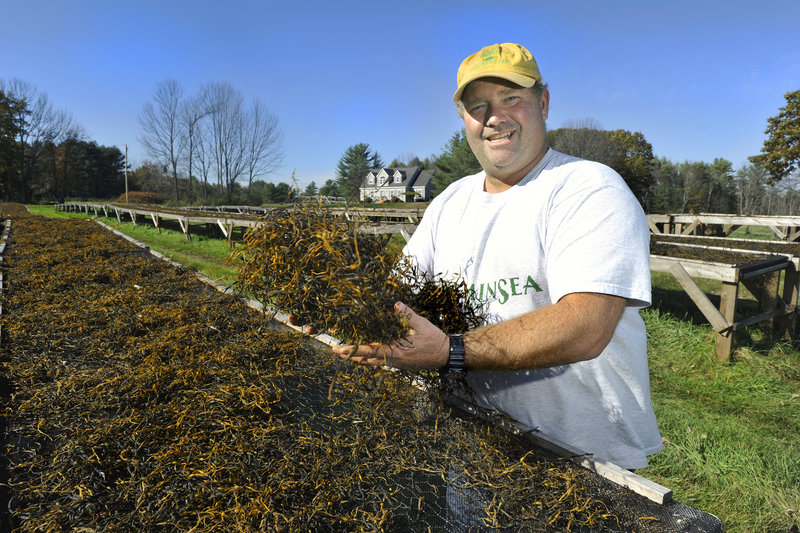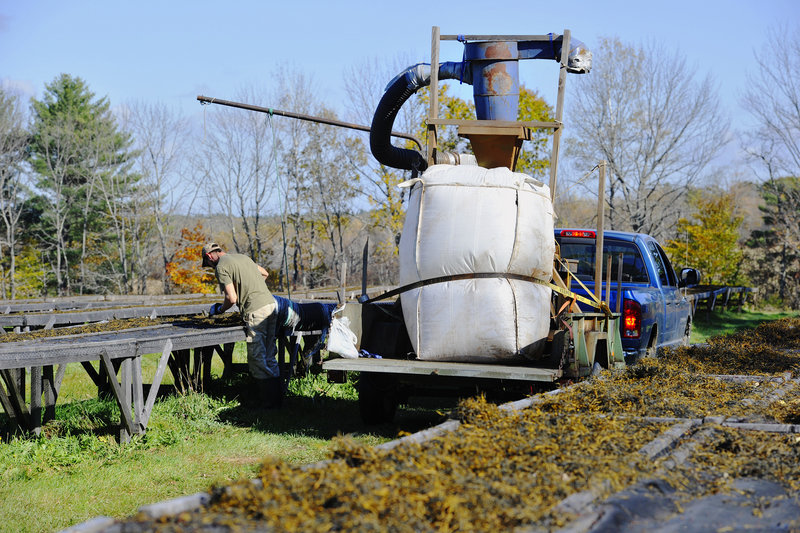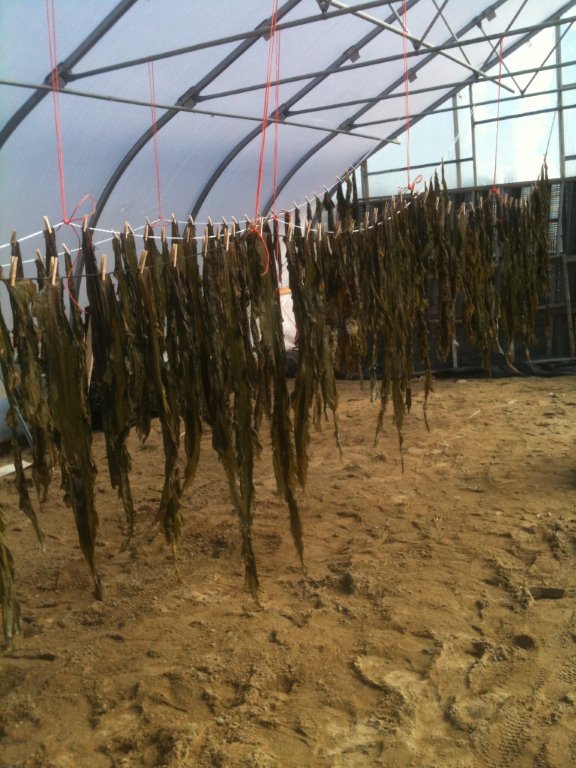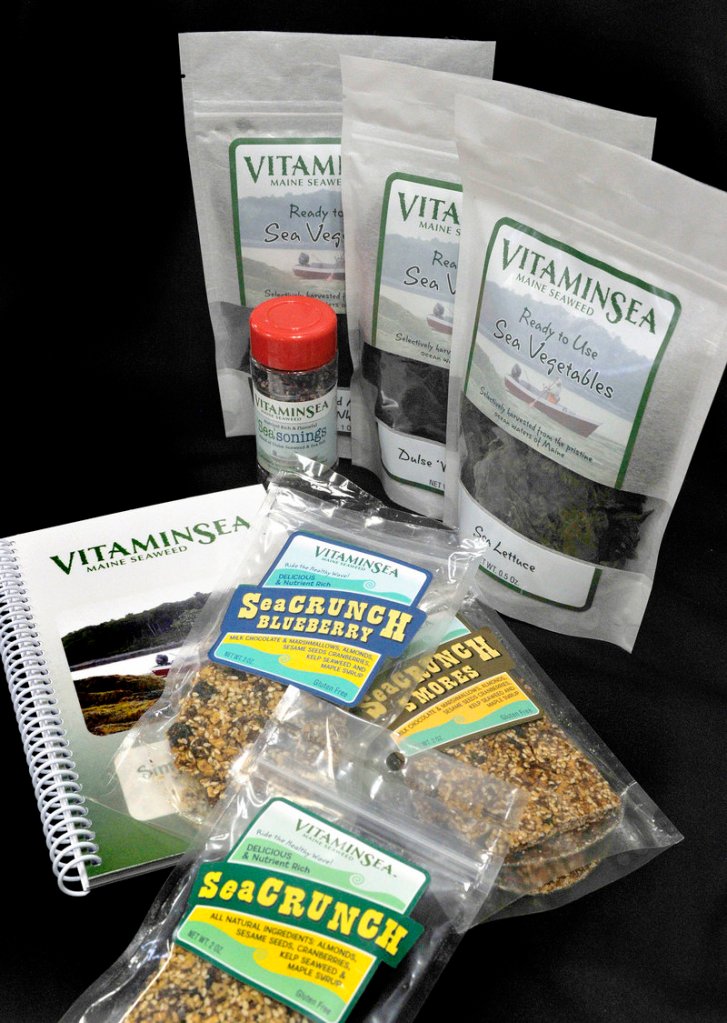Ideas for products made with sea vegetables keep rolling in like the tides, but the challenge for VitaminSea is finding production partners to help keep up with demand.
Right now, company founders Tom and Kelly Roth have reached capacity with the number of SeaCrunch bars they can make in the licensed commercial kitchen in their Buxton home. They’re currently churning out about 1,000 bars a week of the mixture made from almonds, sesame seeds, dried cranberries, kelp and maple syrup. Yet, sales of the bars keep growing and the company plans to introduce two new flavors in the coming weeks, Blueberry (with dried blueberries and dark chocolate) and S’mores (with milk chocolate and marshmallows).
To keep up with the surging demand, the company has contracted with a small bakery in New Hampshire that can produce another 1,000 a week. However, since VitaminSea’s projections show they’ll soon need to produce up to 3,000 a week, the company is actively searching for a Maine partner capable of handling all the production.
“The scary thing is how much it increases every week,” said marketing director Rod Williams, in reference to the company’s sales. “We don’t dare go into Hannaford, because if you can’t keep the shelves full they’ll just take it out.”
Right now the company’s products can be found in locally-owned markets and health food stores. VitaminSea is waiting to approach supermarkets until it can reliably ramp up production.
A relatively new Scarborough-based company that wild harvests seaweed in the cold waters of the Atlantic, VitaminSea is entering a rapid growth phase with a new marketing team, a finance director and an expanding line of products.
In addition to the SeaCrunch bars, its product line includes ‘Sea’sonings (a blend of dulse and sea salt) and a selection of dried sea vegetables (including sugar kelp, kombu, wakame, bladderwrack, dulse, sea lettuce, Atlantic nori and Irish moss).
Products under development include a pita chip seasoned with dulse and garlic, croutons seasoned with seaweed, mixed seaweed flakes and seaweed enriched flour.
“There’s so many things you can do with seaweed that people don’t know,” said Kelly Roth, who has written a cookbook, “Simply Sea-Licious,” which includes recipes for everything from stir-fries to apple pie that include seaweed. “People think you have to eat a whole bunch of seaweed to get the benefits. But you don’t.”
The nutritional punch packed by sea vegetables explains the food’s growing popularity. Those concerned about health are increasingly adding seaweed to their diets. VitaminSea joins a number of seaweed companies in Maine, including Maine Coast Sea Vegetables, Ocean Approved and Ironbound Island Seaweed.
Kin Liversidge is VitaminSea’s vice president of marketing. Both he and Williams worked for natural health and beauty company Tom’s of Maine in its early years.
Liversidge first began adding seaweed to his diet 40 years ago following a cancer diagnosis and his subsequent embrace of a macrobiotic diet, which includes a healthy dose of sea vegetables.
“Seaweed in itself offers nutrients we’re not getting out of our vegetables,” Liversidge said. “I think there’s a tremendous future in this product.”
In contrast, VitaminSea grew out of an industry where the future isn’t as bright.
Tom Roth had been a commercial fisherman for 28 years, when he began hand-harvesting seaweed as a sideline. Initially, he sold the seaweed to lobster companies and quickly reached the point where he was selling 200 bags a week.
At the same time, he knew the fishing industry was becoming more regulated as fish stocks declined. He realized it was a good time to get out of the industry.
With the funds they received from selling the business, the Roths reinvested it in seaweed. A year ago, the Roths expanded their business into edible sea vegetables and related food products.
They started out selling dried seaweed at the Saco Winter Farmers Market, and quickly realized they’d sell more if they offered shoppers samples of a recipe that used seaweed.
The recipe they came up with is now known as the SeaCrunch bar. Soon they were inundated with shopper requests to buy some of the bars. Thus, the company’s first food product was born.
Williams said in addition to being a Maine product, a big selling point for VitaminSea is that its offerings are gluten-free. Health-conscious consumers also appreciate that the company air dries all of its seaweed, rather than using drying machines.
Right now in an open field in Scarborough, the company has more than 200 tables covered in rockweed. This seaweed is sold to animal feed companies, which use it as a nutritional supplement, and landscaping companies, which use it as a non-polluting fertilizer.
In late March, the company will begin harvesting sugar kelp and the harvest will last into May. Then the company switches to harvesting other edible sea vegetables, such as dulse, wakame and sea lettuce.
While seaweed for the animal feed and landscaping industries can be dried in the open air, sea vegetables destined for human consumption are dried under cover. VitaminSea uses plastic-covered greenhouses, where long strips of seaweed dry in warm air.
Tom Roth may continue his fisherman ways by being up and out of the house by dawn, but he doesn’t miss his past profession.
“I don’t know how to tell you how lucky I am to do what I do,” he said.
Staff Writer Avery Yale Kamila can be contacted at 791-6297 or at: akamila@pressherald.com
Twitter: AveryYaleKamila
Send questions/comments to the editors.






Success. Please wait for the page to reload. If the page does not reload within 5 seconds, please refresh the page.
Enter your email and password to access comments.
Hi, to comment on stories you must . This profile is in addition to your subscription and website login.
Already have a commenting profile? .
Invalid username/password.
Please check your email to confirm and complete your registration.
Only subscribers are eligible to post comments. Please subscribe or login first for digital access. Here’s why.
Use the form below to reset your password. When you've submitted your account email, we will send an email with a reset code.